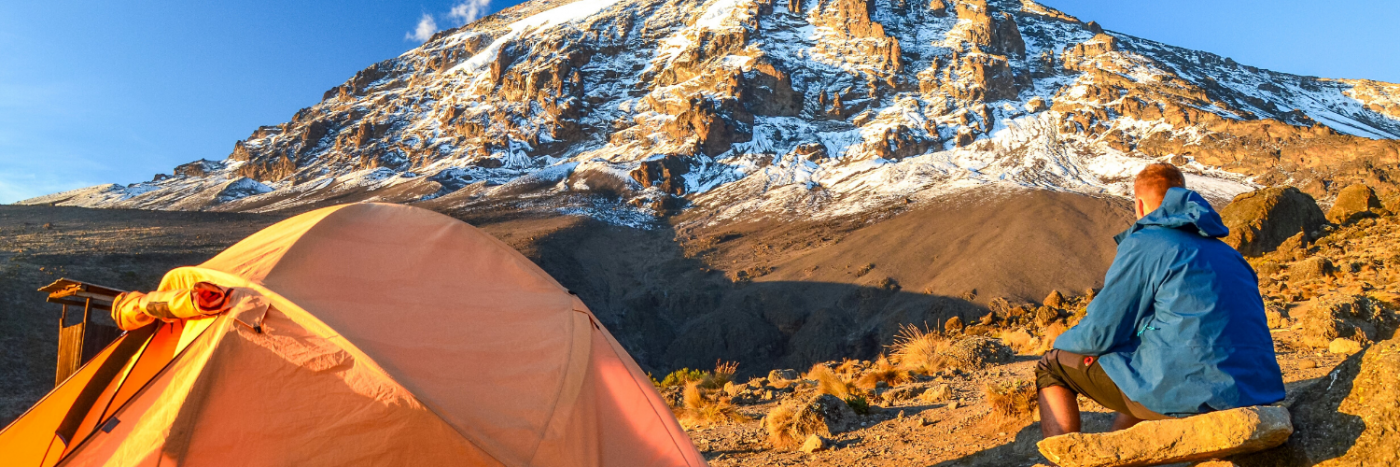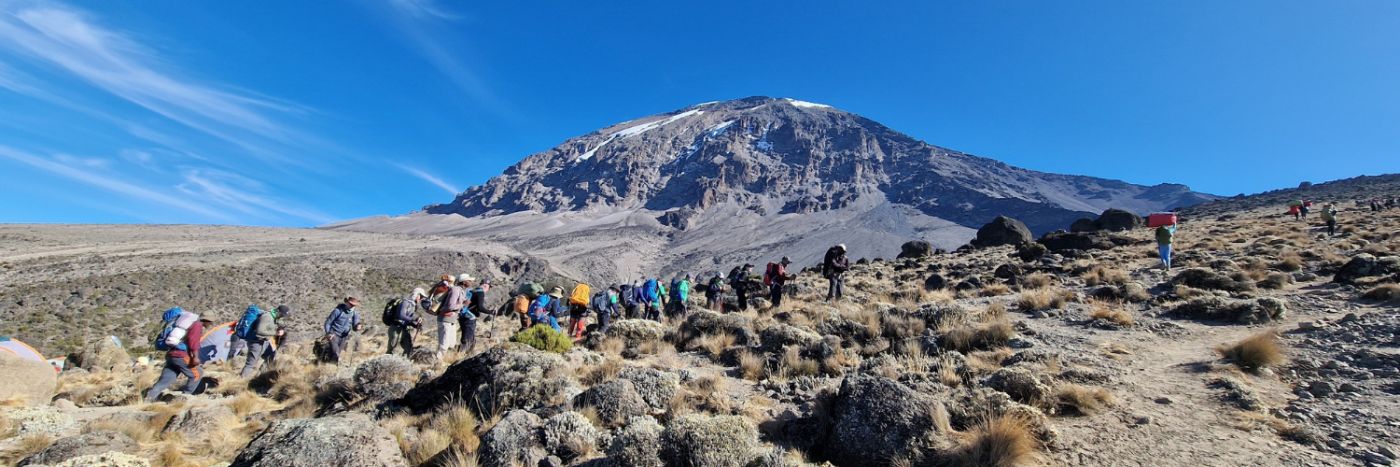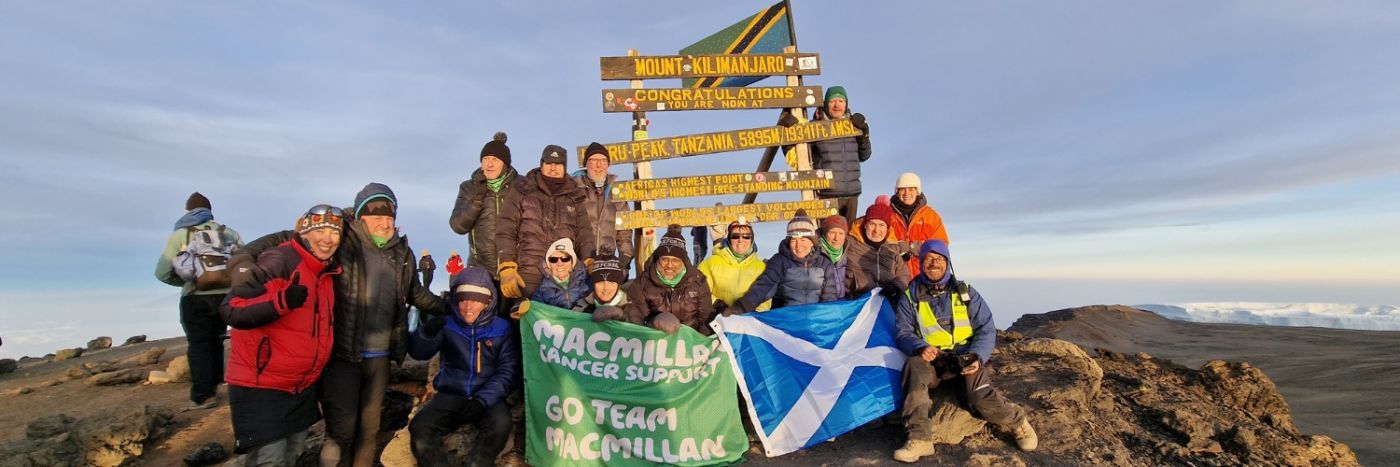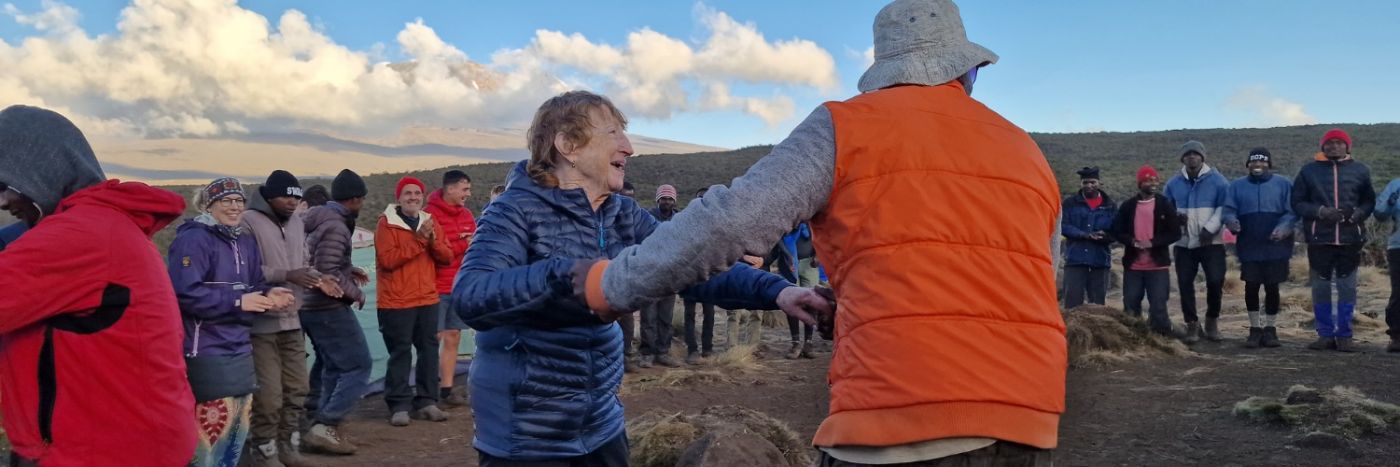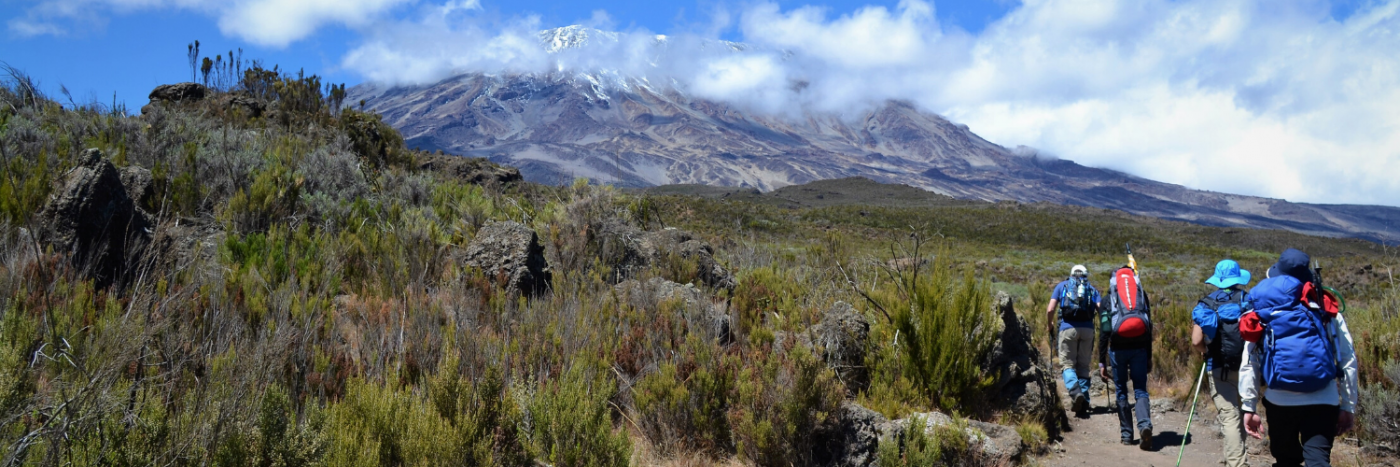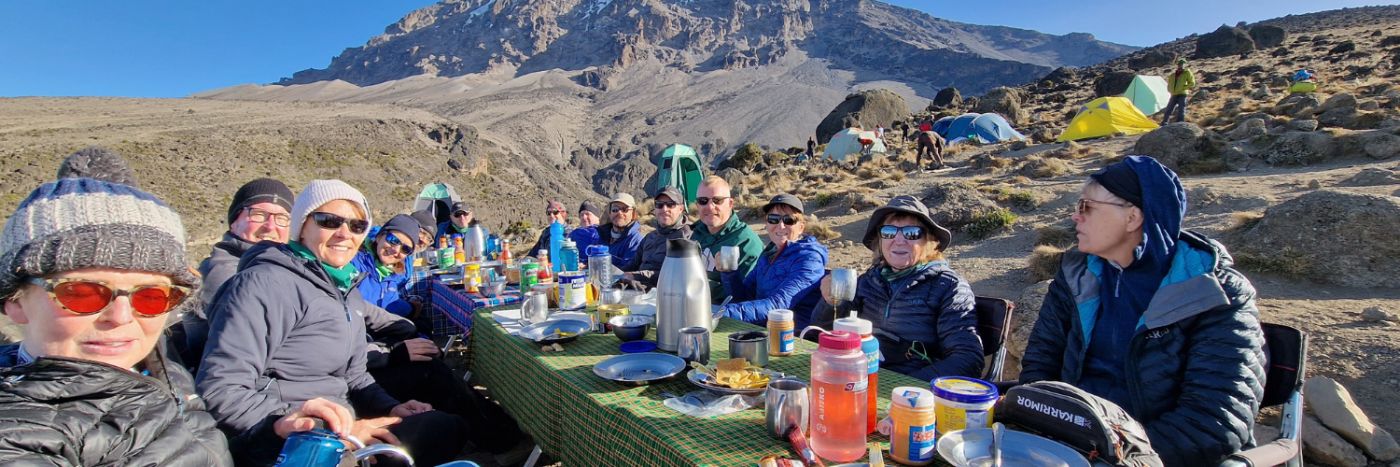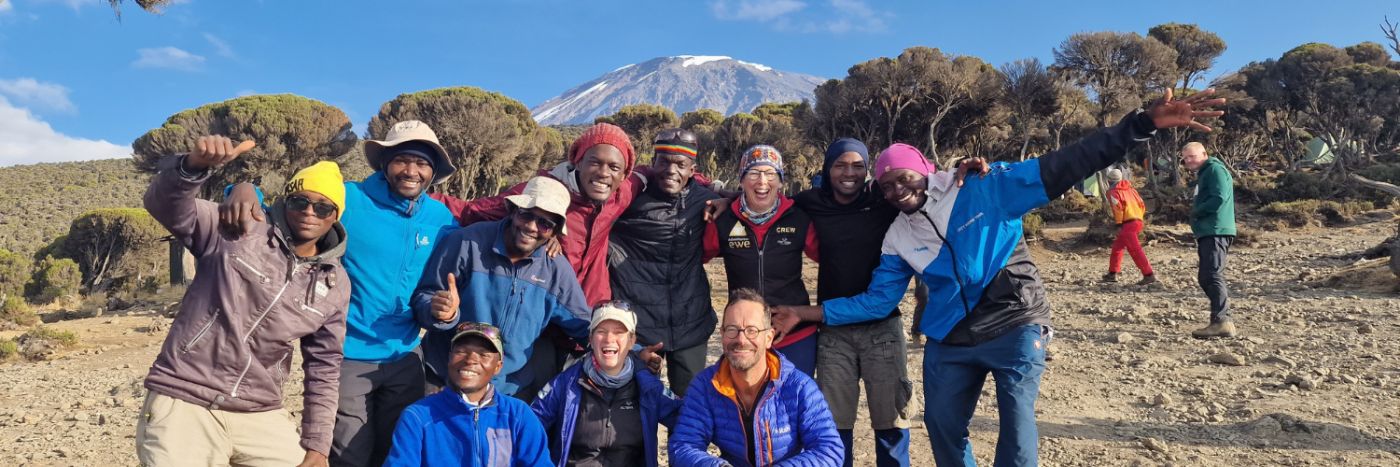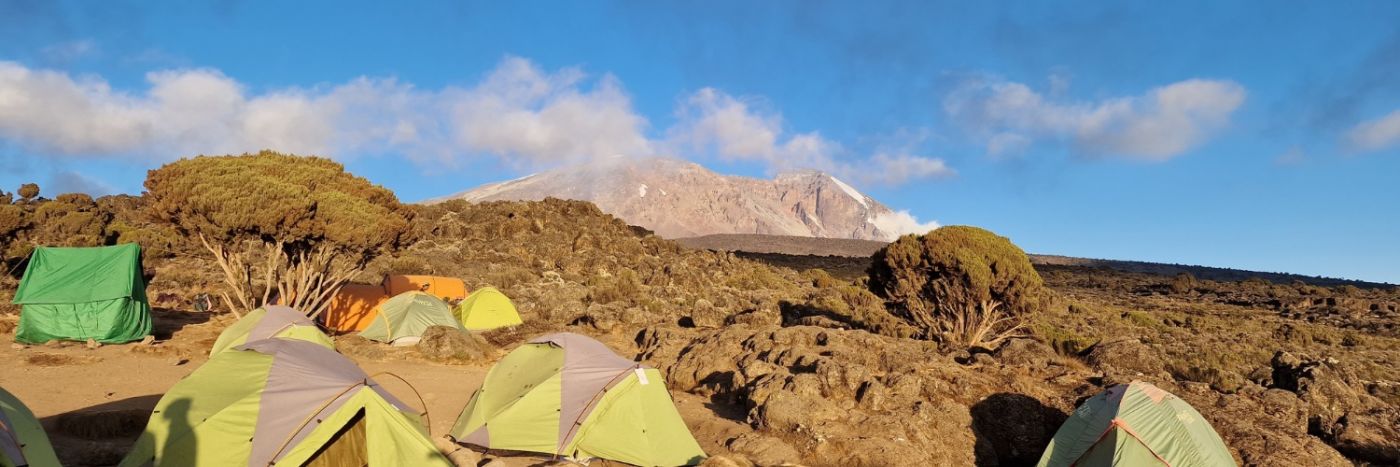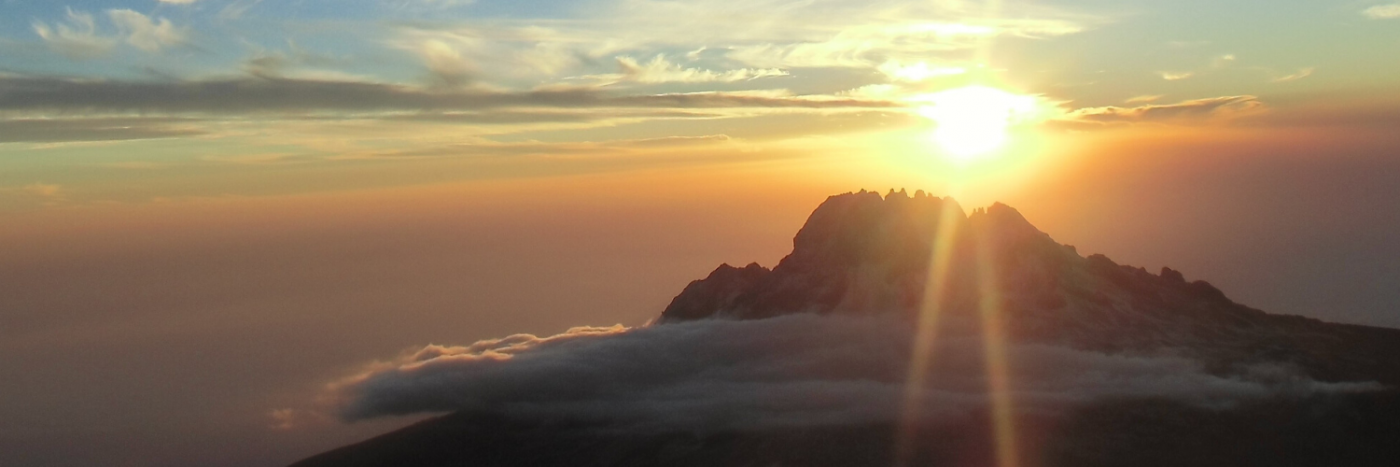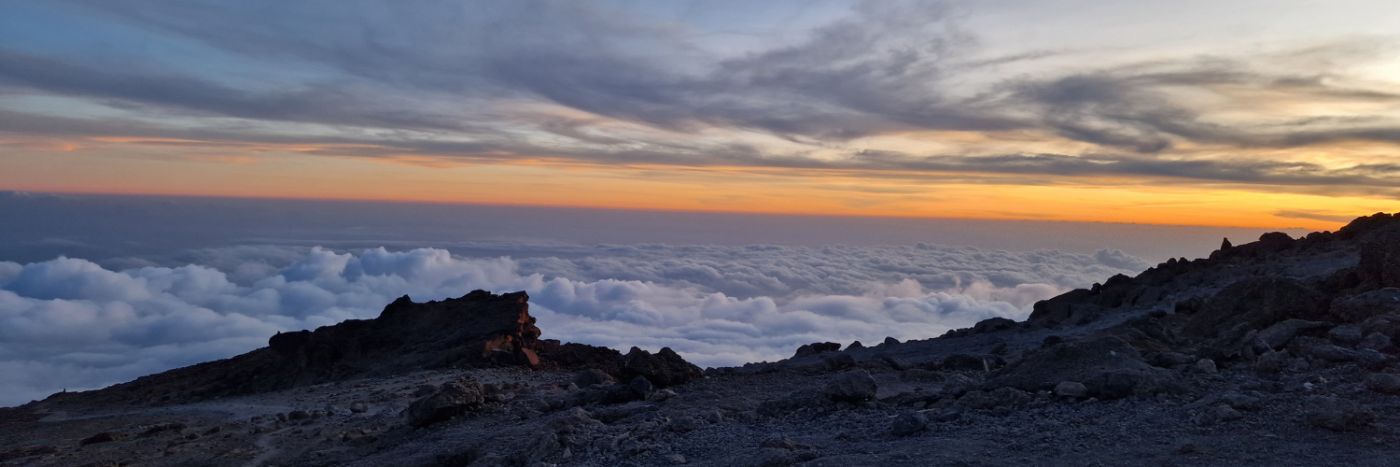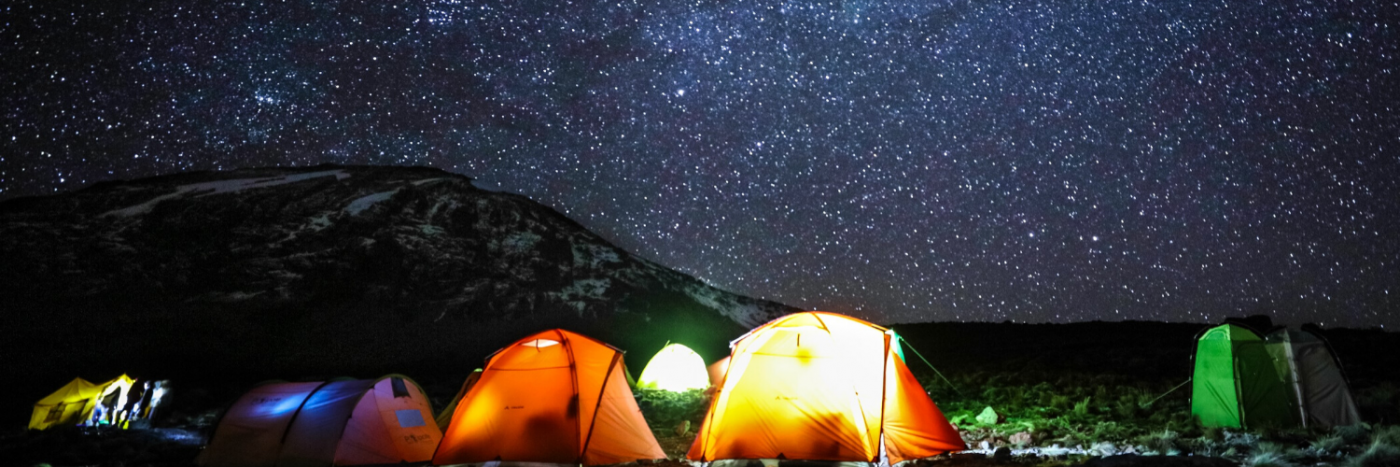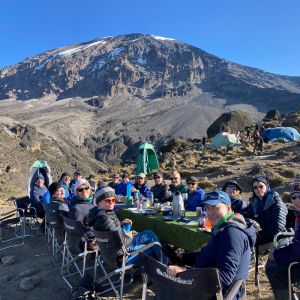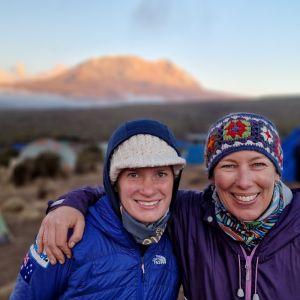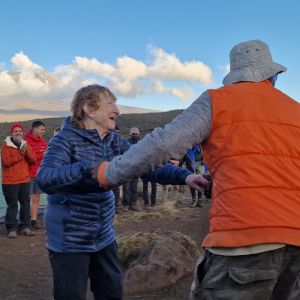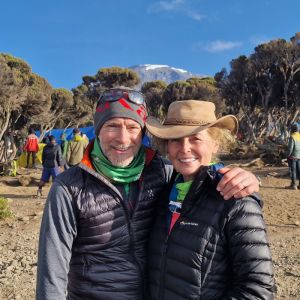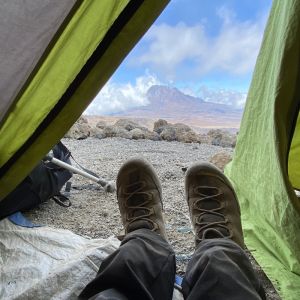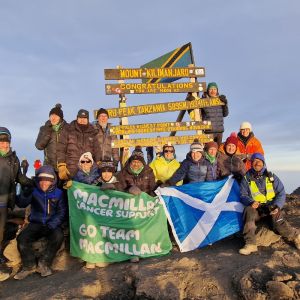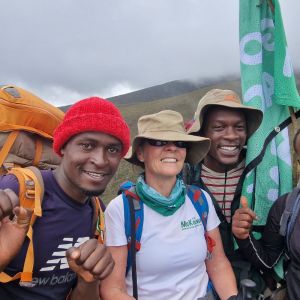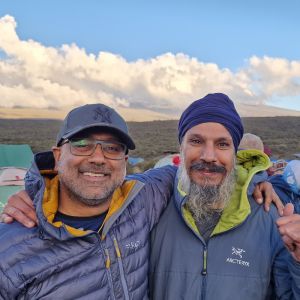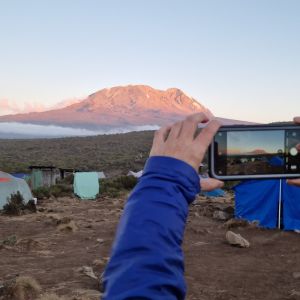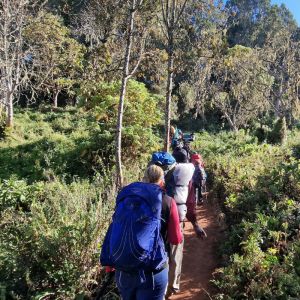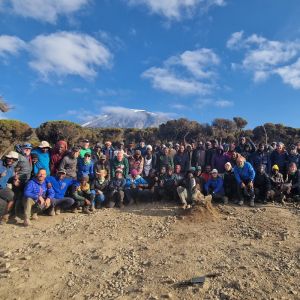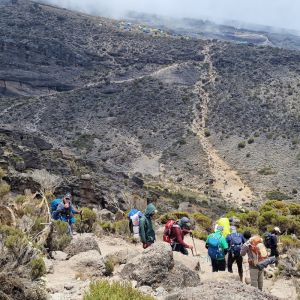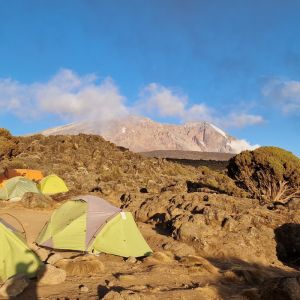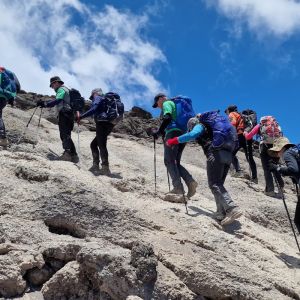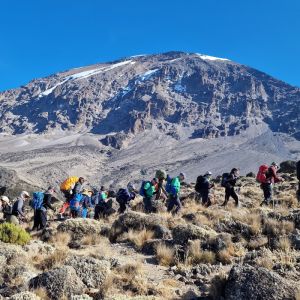- Overview
- Map & Itinerary
- Essential Info
- Pics & Vids
- Dates & Prices
Highlights
- A fantastic 8-day route carefully crafted to maximise your acclimatisation
- Stand on top of the largest freestanding mountain in the world at 5895m
- Camp under a sky full of constellations and the twinkling span of the Milky Way
- Experience the relentless energy and support of your amazing local crew
- Accompanied by vastly experienced guides with 1 guide to 2 trekkers on summit night/day
- Receive expert support from the Adventurous Ewe team with over 35 Kilimanjaro summit achievements
- Check out our previous trip with trekkers aged from early 30’s to late 70’s
- Free Adventurous Ewe Water-to-Go bottle to eliminate our plastic footprint in Tanzania
- Top packing, kit and responsible travel tips provided
- Other routes are available – Rongai, Machame or the Northern Circuit
- Private trips are available for groups over 6 people
- Optional extensions – 1, 2 or 3-day Wildlife Safari’s to Tarangire National Park, Lake Manyara National Park, Ngorongoro Crater and/or the Serengeti, Cultural Experiences or Zanzibar
Overview
Kilimanjaro, situated south of the equator in Tanzania at 19,340 feet, (5895m), is the world’s highest ‘free standing’ mountain, where bright white glaciers flow down from the summit. It is made up of three volcanic cones that were formed by the Great Rift Valley – Shira (3,962m), Mawenzi (5,159m) and Kibo (5,895m).
Climbing Kilimanjaro is like walking from the equator to the North Pole in a week, providing dramatic changes in vegetation and animal life day by day. Your journey to the summit of Kibo will take you through 5 different climate zones 1. Rainforest 2. Heath 3. Mooreland 4. Alpine desert and 5. Arctic summit. Your carefully crafted 8-day trek will allow you plenty of time to acclimatise whilst soaking up this ever-changing scenery.
Local guides will accompany you every step of the way with their intoxicating energy, encouragement, smiles and their vast experience. Reaching the top of one of the famed Seven Summits, under the golden light of sunrise illuminating the glacier will be a memory of a lifetime. The feeling of exhilaration and immense level of pride will be all consuming as you marvel at the incredible views and be in awe of what you accomplished. When you climb Kilimanjaro and stand on the roof of Africa, you see the world a different way. What seemed impossible might just be doable.
Our commitment to the rights and fair treatment of porters and trekking guides and our support of the environmental charity, Cool Earth, means you can rest assured knowing you’re doing the trek of a lifetime the ethical and meaningful way.
Route
Lemosho Route – 6 day ascent
Climbing Kilimanjaro via the Lemosho Route is one of the most scenic routes on Mt Kilimanjaro. This is one of our preferred routes due to it being one of the quietest and most varied ascents offering stunning scenery and a high summit success rate with it being one of the longest of the regular routes. Starting from the west at the more remote Londorossi Gate, the first two days of the Lemosho route are spent trekking through the flourishing rainforest, with a good chance of seeing wildlife, up to the scenic moorland of the Shira Plateau offering great views of Kibo’s southern glaciers.
This plateau is one of the largest high altitude plateaus in the world. You will spend 4 nights at close to 4000 meters, which is ideal for acclimatisation, before moving on to complete the final stage to the summit of Kilimanjaro. A pre-dawn start on the last day of your ascent enables you to reach Kibo crater rim to absorb the sun breaking the African horizon before reaching the high point at Uhuru Peak (5895m) in time to see the glacier towers illuminated by the golden light of the early morning sun.
Mweka Route – 2 day descent
You will descend via the Mweka Route due to it being a direct route to the foot of Kilimanjaro with one stop over at Mweka camp. On your last day there is the chance of seeing a great array of birdlife and even catch a glimpse of Colobus monkeys as your path winds its way through the rainforest.
Flight from UK to Kilimanjaro International Airport
Overnight flight
Flights are not included in your Kilimanjaro adventure giving you the flexibility to depart from the airport of your choice and extend your stay in Tanzania if you wish.
We will provide you with the recommended flights for this trip in order for you to take up the airport transfers included in Tanzania. Alternately, you can book your flights through our Flight Agent who is ATOL & ABTA protected.
Arrive and pre-trek briefing
A warm African greeting is awaiting you on your arrival at Kilimanjaro International Airport where you will be transferred to your hotel in Moshi. Both your UK Leader and Local Guide will provide you with a comprehensive trek briefing and do an equipment check to make sure you have all the necessary clothing and equipment. Gear which is missing can be rented.
Time to enjoy dinner and get a good night’s rest before leaving for the mountain the following day.
Included
Accommodation: Hotel (twin share basis)
Meals: Dinner
Trek Lemosho Glades (2385m) to Big Tree Camp (2780m)
After breakfast at your hotel, you will be transferred to the quieter Londorossi Gate on the west side of Kilimanjaro. The road heads out of town passing between the slopes of Kilimanjaro and the horseshoe-shaped volcanic crater of Mt. Meru.
After completing the necessary registration formalities, it’s a short drive through farmland and plantations that thrive in this area with fertile soil of the mountain’s lower slopes to reach the Lemosho roadhead. The last 5km of the road to the park gate is along a track and all part of this great adventure. With meeting the local team and seeing the impressive sight of them organising all the food and kit, you’ll have lunch in the glades before starting your Kili trek. It’s the ideal first day on the mountain with slight gain in altitude taking approximately 4 hours through plantation pine forest and remnant rainforest, to arrive at camp mid to late afternoon. Your first camp on Africa’s greatest peak is at Miti Kubwa (Big Tree) camp at 2780 metres.
Distance covered: approx. 7kms / 4.3miles
Trekking time: approx. 4 hours
Included
Transfers: From hotel to Londorossi Gate
Accommodation: 3 season mountain tents (twin share basis)
Meals: Breakfast, lunch and dinner
Trek Big Tree Camp (2780m) to Shira 1 Camp (3500m)
Today your route takes you across a plateau of grassy moorland and heather scattered with volcanic rock formations. Your destination for the day is Shira 1 Camp from where there are often views of Kibo Peak floating above the clouds. There is the chance of seeing some wildlife here, especially birds of prey, including the Auger Buzzard. The team will gain a reasonable amount of altitude on this day and parts of the route are fairly steep.
Distance covered: approx. 8.5kms / 5.3miles
Trekking time: approx. 7 hours
Included
Accommodation: 3 season mountain tents (twin share basis)
Meals included: Breakfast, lunch and dinner
Trek Shira 1 Camp (3500m) to Shira 2 Camp (3900m)
Today you will get the chance to view the Northern Ice fields from the western side of the mountain with some impressive views of Kibo. Your route continues across the Shira Plateau which is the remains of the Shira Caldera, Kilimanjaro’s oldest volcano (which last erupted around 700,000 years ago). This whole area was then submerged by eruptions from the much younger Kibo eruptions of 100,000 to 200,000 years ago. Enjoying a well-paced day of trekking with a steady climb gives you plenty of opportunities to adjust to the demands of hiking at altitude whilst also absorbing the stunning scenery of Africa’s highest peak! You are likely to see some interesting fauna and flora, particularly the White Naped Raven. To further aid your acclimatisation you will do a 200m ascent of Shira Cathedral (3872m), a huge buttress of rock surrounded by steep spires and pinnacles with vast views down to the rainforest below. Today’s destination is Shira 2 Camp where you will have full view of Uhuru Peak.
Distance covered: approx. 8kms / 5miles
Trekking time: approx. 5 hours
Included
Accommodation: 3 season mountain tents (twin share basis)
Meals included: Breakfast, lunch and dinner
Trek Shira 2 Camp (3900m) to Barranco Camp (3960m)
Today you will break the 4000m mark on your ascent as you enter the next climatic zone on Kilimanjaro, the low alpine desert. Your path traverses the lava ridges beneath the glaciers of the Western Breach, where you will be rewarded with far-reaching panoramic views. With reaching the distinct pinnacle of the Lava Tower (4640m), the highest point of the day, you will have lunch nearby to help with your acclimatisation. In the afternoon you will make a steep descent to your camp located at the base of the Great Barranco Valley (3960m) which is sheltered by towering cliffs and with extensive views of the plains far below. This is known as climbing high, sleeping low and is vital to helping with your acclimatisation.
Distance covered: approx. 10kms / 6.2miles
Trekking time: approx. 7 hours
Included
Accommodation: 3 season mountain tents (twin share basis)
Meals included: Breakfast, lunch and dinner
Trek Barranco Camp (3960m) to Karanga Camp (3963m)
A short steep climb up the famed Barranco Wall following a line in this rock barrier will take you up onto the southern slopes of Kibo. Whilst the ascent is not technical there are a few sections where the Guides and support team will be there to help you negotiate some of the steeper areas. On a clear day you will be rewarded with some of the greatest views on Africa’s highest peak. Your path then leads along an undulating trail on the south-eastern flank of Kibo, with superb outlooks of the southern icefields. Passing underneath the Heim and Kersten glaciers, you will then head towards the Karanga valley to camp at Karanga set at 3963m. For those feeling strong there is a mid-afternoon acclimatisation trek to around 4200m before descending back to camp for the night.
Distance covered: approx. 5.5kms / 3.4miles
Trekking time: approx. 5 hours
Included
Accommodation: 3 season mountain tents (twin share basis)
Meals included: Breakfast, lunch and dinner
Trek Karanga Camp (3963) to Barafu Camp (4640m)
After a good night’s rest and breakfast, you will set off across the rugged volcanic wilderness to Barafu camp at 4640m. The climb takes you across desolate scree slopes with no vegetation. The views become more spectacular with the height gain above the clouds. You will overnight at Barafu camp. With Kibo rising above you to the north and good views of Mawenzi Peak, the eastern-most summit of Kilimanjaro it’s certainly a memorable camp location and will be your base for the final push to the summit. On arriving at camp you will have lunch and spend the afternoon resting as you prepare for a long night and day ahead. It is important to keep hydrated and warm. You will have an early dinner and then try to get some sleep as you will be getting up between 11pm and 12am to start the climb to the summit.
Distance covered: approx. 3kms / 1.9 miles
Trekking time: approx. 3 hours
Included
Accommodation: 3 season mountain tents (twin share basis)
Meals included: Breakfast, lunch and dinner
Trek Barafu Camp (4640m) to UHURU PEAK (5895m) & down to Millennium Camp (3790m)
In the early hours of the morning under a star filled sky you will start your final push to the summit glaciers. Taking advantage of the best surface conditions (frozen scree and possible snow), your path will climb via some well-graded zigzags at a slow but steady pace reaching the iconic Stella Point (5735m), in around 5 – 6 hours. This is one of the toughest parts of your ascent but your torchlight trek will be rewarded with a spectacular sunrise over the jagged Mawenzi peak. With the bright white ice cliffs in the crater turned golden by the early sun, you will follow the crater rim for about
an hour on easier terrain to ascend to the highest point in Africa – Uhuru Peak (5895m). Congratulations! After enjoying your epic summit achievement and taking the obligatory photo, you will begin your descent by returning to Barafu camp for breakfast before continuing down to Millennium Camp for a well deserved rest.
Distance covered: approx. 13.4kms / 8.3miles
Trekking time: approx. 12 – 16 hours
Included
Accommodation: 3 season mountain tents (twin share basis)
Meals included: Breakfast, lunch and dinner
Trek Millennium Camp (3790m) to Mweka Gate (1630m)
Before your last day on Kilimanjaro you will bid a fond farewell to your trusty local crew of porters who been a fundamental part of the team for the past week. Then a long yet gentle descent on a well-constructed path takes you down through lovely tropical forest alive with birdsong and the chance to catch a glimpse of Colobus monkeys. On arrival at Mweka Gate you will complete park formalities and receive certificates of ascent before being transferred back to your hotel. A shower and a beer (not necessarily in that order) will be a welcomed sight plus time to reflect on your Kili adventure amongst some new-found friends. That evening you’ll enjoy a celebratory dinner with your Guides and a well-deserved sleep in a hotel bed!
Distance covered: approx. 12.1kms / 7.5miles
Trekking time: approx. 6 hours
Included
Transfer: From Mweka Gate to hotel
Accommodation: Hotel (twin share basis)
Meals included: Breakfast, lunch and celebration dinner
Free morning (depending on your flight times)
You can either relax by the hotel pool or take a free shuttle bus into Moshi Town to explore for souvenirs or simply enjoy a coffee. It’s a low-key place with an appealing blend of African and Asian influences and a self-sufficient, prosperous feel, due in large part to its being the centre of one of Tanzania’s major coffee-growing regions.
Included
Transfer: From hotel to Kilimanjaro International Airport
Meals included: Breakfast
*Option to extend your trip in Tanzania with Safari and Zanzibar packages available or you can return home.
Arrive back in the UK
Filled with an immense sense of pride and achievement together with some fantastic new friendships and memories of a lifetime.
Supporting local tourism and communities
Since the COVID-19 pandemic hit the tourism industry which employs 1 in 10 people worldwide, we’re keen to promote sustainable adventures to help support local communities and give you the chance to have a more meaningful travel experience.
Our Kilimanjaro Trek has been designed to deliver an amazing experience and showcase the some of the most epic mountain landscapes whilst also giving you the chance to step out of your comfort zone and gain a greater understanding of the mountain, the local environment, local communities and the culture.
We’ve crunched the numbers to work out the total carbon footprint of the Kilimanjaro Trek, and plant or protect enough trees to suck 2x as much back out the atmosphere.
What’s the number?
It works out on average at 251kg of CO2 emissions per person, including all local transport, accommodation, food, activities, leaders, crew and office operations.
The only thing not included is travel to Tanzania. Given that our beloved guests travel from all parts of the UK for this adventure we have no way of reliably knowing their travel plans therefore we’re unable to include an individual number in the figure on display here.
What does the number mean?
To give you a snapshot of the numbers:
- Driving 1000miles/1609km would be approx. 281kg of CO2 in an average car (or 140.5kg per person if there was 2 of you).
- A return economy class flight London – New York would be approx. 1,619kg (1.66 tonnes) per person.
- 10 trees in a temperate forest are estimated to remove approx. 250kg of CO2 from the air over a period of 5 – 10 years.
What are we doing about it?
Our adventures are relatively low-carbon by design, and we’re working to develop long term carbon reduction plan. Following much research into climate change organisations, we carefully selected to support the environmental charity, Cool Earth. They’re a sustainable operation and work with rainforest communities across the globe to halt deforestation and it’s impact on climate change. We invest 1% of our revenue into supporting critical conservation projects world-wild with Cool Earth.
On a local level here in the UK, we’re an ongoing business member of the Snowdonia Society, plus Jim and Sue, together with some of our local leaders, also help the Society with their local projects such as planting native trees in Snowdonia. This is to help preserve the landscape and enhance wildlife habitat here in Snowdonia.
Want to know more?
We believe that with great travel, comes even greater responsibility. Tourism is one of the most important and largest industries on the planet. It employs more people worldwide than any other, with millions of families relying on tourism for their daily needs. At Adventurous Ewe we believe that our type of small scale, positive impact tourism can bring benefits to many communities, help preserve the environments we travel to see, and provide real and positive social exchanges. Here is our plan to do our part towards helping reduce factors that we can contributing to climate change as part of Tourism Declares a Climate Emergency.
As well as carefully crafting amazing and meaningful adventures across the planet, we’ve made booking them as flexible, safe and as simple as possible. With the ongoing impact of COVID-19, we’ve made a number of updates to our safety guidelines, flexible booking conditions and trip departures. For more info, please our Book and Travel with Confidence page.
On joining us for the Kilimanjaro Trek, you will receive all the exciting trip info via our free mobile travel app.
You’ll have access to your itinerary, trip countdown, live updates, contact info, weather forecasts, know before you go trip info, kit lists and much more at the touch of a button 24 hours a day via your mobile phone. No more unnecessary use of reams of paper to benefit the environment and the need of carrying around documents with you. A’ppy days.
With being a small family business we pride ourselves with providing personal, professional and friendly service. We appreciate that everyone has different levels of experience and reasons for wishing to embark on this Mt Kilimanjaro Trek and therefore require varying levels of support and guidance. We’re here to help you every step of the way from the moment you join the flock all the way through to completing the trek and beyond. Jim and Sue’s knowledge and expertise stems from dozens of years of travelling and exploring the destinations that we visit in order to fully support you in the lead up to your adventure. Plus with over 35 successful summit achievements between them, they are best placed to answer any of your questions, no matter how big or small.
Flights are not included in your Kilimanjaro adventure giving you the flexibility to depart from the airport of your choice, use any of your frequent flyer points or extend your stay in Tanzania if you wish.
We will provide you with the recommended flights for this trip in order for you to take up the airport transfers included in Tanzania. Alternately, you can book your flights directly through our Flight Agent who is ATOL & ABTA protected.
If you arrive outside of our recommended flight times, you will need to make your own travel arrangements in Tanzania. We can help you with this if you need and we recommend:
- Public transportation which is considerably less expensive than taxi
- Public transportation leaves a much smaller environmental footprint
- Or if there is 3 or more of you, then taxi-sharing is also an option to help with costs and reduce separate journeys and a higher carbon footprint.
All nationalities require a full passport that must be valid for 6 months beyond the intended length of stay in Tanzania. Airlines may not carry passengers holding passports with less than 6 months validity.
UK passport holders require a visa to enter Tanzania. The visa is obtainable through an online Visa Application Process. This visa is granted to foreign national for the purposes of Visit, Tourism, Leisure, Holiday, attending Conference, Humanitarian and charity activities, Family Visit, Health Treatment or any other purpose as may be determined by the issuing authority. Its validity does not exceed 90 days for a single entry. The online application requires a scanned passport photo and a scanned copy of your passport bio page. Further details for the online visa is given with your booking.
Also, please visit the UK Foreign & Commonwealth office website, or your respective nationality governing website, for the latest travel information on Tanzania at:
https://www.gov.uk/foreign-travel-advice/tanzania
Transit via Kenya: If you are travelling via Kenya to your destination you may also require a visa for Kenya. If you have connecting flights and your baggage has been checked all the way through to your destination you will not need a Kenyan visa.
Travel Insurance
Travel Insurance is an important part of any booking. It is compulsory that everyone who travels with us has taken out adequate travel insurance which includes, among other things, cover for the full value of your trip, medical (emergency, evacuation and repatriation) arrangements, trekking to a height of 5895 metres, personal liability, cancellation, curtailment and loss of luggage and personal effects and COVID-19 travel cover.
For UK residents we have partnered with Campbell & Irvine Direct to provide you with a travel insurance. If you would like to obtain cover for your trip please feel free to contact specialist Insurance Brokers, Campbell Irvine Direct for a quote.
You must send your Travel Insurance Policy to Adventurous Ewe no less than 8 weeks prior to departure.
Global Rescue Membership
For peace of mind whilst trekking in the mountains, Global Rescue provides short term membership giving access to travel, security, medical advisory and evacuation services up to $US500,000. They’re a specialised field rescue company, and assist from the point of illness or injury by getting you to the closest and most appropriate medical facilities to get stabilised. Once fit to fly if you require additional inpatient treatment Global Rescue will further evacuate and repatriate to your home hospital on record. These services are all covered through their upfront membership fee with no claims process. For more info, please click here.
Vaccinations
For the most up to date info on vaccinations, please consult with your GP or travel healthcare practitioner 8 weeks in advance of travel.
Yellow fever vaccination certificate required for travellers arriving from countries with risk of yellow fever transmission and for travellers having transited for more than 12 hours through an airport of a country with risk of yellow fever transmission, this includes the airports of Nairobi (Kenya) and Addis Ababa (Ethiopia).
Recommended vaccinations are: Polio, Tetanus, Typhoid, Hepatitis A. Malaria prophylaxis is essential and we suggest that you seek advice from your GP or travel health clinic about which malaria tablets to take. Dengue fever is a known risk in places visited. It is a tropical viral disease spread by daytime biting mosquitoes. There is currently no vaccine or prophylaxis available for Dengue, and therefore the best form of prevention is to avoid being bitten. We recommend you take the usual precautions to avoid mosquito bites.
If you will be travelling with medication (including over the counter medication) you should check for any restrictions on medications before you travel. You can do this by contacting the Tanzanian embassy.
For up to date vaccination information please check the NHS government website ‘Fit for Travel’ at: https://www.fitfortravel.nhs.uk/destinations/africa/united-republic-of-tanzania
Rest assured we are monitoring and activating the guidelines and recommendations put in place by the respective governments and World Health Organisation as a result of COVID-19. You will receive our operational guidelines for this expedition when you join the trip and hand sanitiser and face masks will be provided for travel. Rest assured your safety and wellbeing is our top priority at all times.
Severe allergies
If you have a severe allergy please inform us at the time of booking. We will do all we can to help, but unfortunately we are unable to guarantee an allergy free environment on this trip. You will need to carry your own treatment for the allergy with you, as ‘adrenaline auto-injectors’ are not carried as standard by AE leaders and crew. Whilst your leader is aware of our trekkers medical history, please also inform your leader on arrival of your allergy, and let them know where you keep your adrenaline pen.
Adventurous Ewe puts the safety and well-being of you, our leaders & crew and the communities we visit at the centre of all our operations, always. Your safety and well-being is our top priority. The Kilimanjaro Trek is intentionally challenging and requires individual preparation as the trip is designed to take you out of your every-day comfort zone and achieve something extraordinary. Rest assured we have a thorough Safety Management System, indepth risk assessments and risk management systems in place.
You will be accompanied by local qualified Mountain Guide/s and a UK High Altitude Mountain Leader for groups over 8 people. All our Guides are Remote First Aid trained and have extensive experience in leading teams in this region. They will be ultimately responsible for your safety on this trip.
There will be ICOM radio contact between Adventurous Ewe Mountain Leader, Local Leaders & crew and the Office Base in Moshi Town at all times during your trek. Your Mountain Leader will also carry a Satellite phone for emergencies only and have 24-hour contact with Adventurous Ewe office in UK. In the unlikely event evacuation be required the Tanzanian National Park rescue service have emergency vehicles on standby at exit routes from the mountain. All staff are highly trained with the evacuation procedures. A member of our staff will be carrying medical supplies and oxygen, should it be required.
If for any reason you need to leave the group early and come off the mountain, local staff will assist you with your descent and will arrange transfers, accommodation and medical care if necessary. All costs incurred due to an early descent will need to be covered by the individual before departing the hotel.
Many national governments provide a regularly updated advice service on safety issues involved with international travel. We recommend that you check the Foreign & Commonwealth Office Travel advice website for their latest travel information before departure and ensure that your travel insurance covers you for all areas your itinerary covers.
Please visit: https://www.gov.uk/foreign-travel-advice/tanzania.
We also ask that you please ensure you use your alcohol-based hand sanitiser at all times to minimise the spread of any germs throughout your fellow flock of trekkers!
For more info, please visit our Safety and Well-being page.
Your UK Mountain Leader will have many years leading teams on Kilimanjaro and be an experienced high altitude guide. Our Leaders are carefully selected to ensure you have the best experience on your trek and with a bit of humour thrown in for good measure. Your UK Mountain Leader will also have Remote First Aid qualifications as well.
Our Local Guides are very experienced, well trained, knowledgeable and charismatic. They are constantly self-driven to go above and beyond to ensure you will have an amazing experience. Mountain climbing for the local guides is more than just a career, it’s a passion which they are proud to share with others. They understand it’s the little things that make a big difference and their keen attention to detail ensures that they always exceed expectations. Your team of local guides have received extensive training and certifications from local and international organisations including the Kilimanjaro National Park Authority and Training Expertise UK.
Standard client to mountain crew ratio is 1:4 and on summit night there will be 1 Assistant Guide to every 2 trekkers.
Our Guides are responsible for ensuring the complete safety, wellbeing and enjoyment of the team whilst also retaining a flexible and supportive attitude. The Leaders/s have satellite phone, radio and mobile phone contact with base, the local office in Moshi and Adventurous Ewe’s HQ.
Porters welfare: We understand porters, and the whole mountain crew in general, are the heart and soul of our Kilimanjaro treks and we believe that fair treatment of our crew on the mountain is not merely an industry requirement but the tenet of every Kilimanjaro expedition. Ensuring our crew is well fed, equipped, paid and cared for is a priority for us together with the potential to advance in their career path on the mountain.
When we trek, the entire group ‑ you, the guides and porters alike ‑ are a team who share the same needs for safety and wellbeing in this mountain environment.
We pride ourselves in small group travel to minimise the impact on the environment and to make your experience more authentic and safe.
The minimum group size for the Kilimanjaro Trek to run is 6 people and the maximum group size is 24 people.
You are most welcome to join this mountain trek as a group of friends, family, colleagues, a private bubble or as a solo traveller. You are also welcome to use this trip as a fundraiser for the charity of your choice.
If you have a group of over 6 people, we would be more than happy to run a private trip for your team, your charity or your company.
For any further info or to chat about running a bespoke trip, we’d love to hear from you at info@adventurousewe.co.uk or call 01492 588 069.
Trekking experience and level of difficulty – ‘Extreme’
This is a tough trek, reaching an altitude of 5,895m, but one that is very achievable with the correct preparations. It requires a reasonable level of strength, stamina, endurance and determination. Even if you consider yourself fit, you may still find the climb very challenging, depending on how well your body acclimatises to high altitude. There is no scientific way to determine how easily you acclimatise, and the acclimatisation process can also differ from climb to climb. The trek is fully supported by qualified, encouraging guides who are there to ensure your trip is a safe and successful one. The climb is a tough one, but with the right mind set and preparation, it’s achievable for those with a good level of fitness and all being well with how your body adapts to the acclimatisation.
Having been operating Kilimanjaro treks for many years now, we strongly recommend the 8-day Lemosho route due to maximising time for acclimatisation, experiencing the beautiful and varied scenery and also for it’s quieter path. You will be trekking high and sleeping low on some nights to help with acclimatisation as well.
Most of the trails on Kilimanjaro are well defined and of good quality but some forest sections can be slippery particularly in poor weather conditions so good boots and trekking poles are ideal. There is a short rock scramble on Barranco Wall which rises 843 feet (257 meters) above the Barranco Valley. Steep, narrow paths cut back and forth along the rock face, making the Barranco Wall one of the more challenging sections of the mountain, though you don’t need any technical climbing skills for this section. Most trekkers are thrilled that they get to experience the Barranco Wall and it is often a highlight of the ascent! Your guides will position themselves at strategic points on the Wall for support. The final push to Uhuru peak is almost entirely on scree and loose rock without permanent footpaths however you will be accompanied by Assistant Guides during the section at a ratio of 2 people to 1 guide. Their relentless support and encouragement will make a dramatic difference to your summit bid.
Please also be prepared for varied conditions and temperatures especially as you ascend. You are likely to be cold, washing facilities are minimal, the loos are different from the luxuries at home and your appetite may be affected by altitude. Camping and sleeping proves more difficult as you ascend too. You should be prepared for an early start every day on Kilimanjaro and a long night/day of trekking for the summit bid. Though please remember that everyone on your trek will be experiencing the same and as a team pursuit, we encourage strong teamwork and support.
A bespoke training programme will be provided when join the team for Kilimanjaro to help you with your preparations. Your training should incorporate aerobic (endurance building), anaerobic (strength building) exercises and some good long walks! Training in your trekking kit with your ruck-sack on consecutive days in the outdoors is ideal to help with your preparations too. The training programme includes info, videos and an exclusive discount code for a 28 day kettlebell training programme which is ideal for strength and endurance training. The more you are prepared, the more you will enjoy the experience.
Our motto is: Train hard, smile harder and enjoy the journey!
06.00 – 06.30 start the day with bed tea followed by a hot breakfast. Hot water in bowls will be available most days for washing your hands and face. Following breakfast and filling your water bottles, you will start trekking as a team. Your trek leader will set a slow pace, with assistant leaders and UK Leader walking amongst the group to offer support. There will be regular short breaks to rest and refuel on snacks and water and a longer stop for lunch.
On arrival into camp, there will be time relax and enjoy a hot drink, before sitting down together for dinner and a briefing by your leader for the following day. Your main kit bag, tents and camping equipment will be carried by porters and will be set up each evening as you arrive into camp. All main meals – breakfast, lunch and dinner are prepared, cooked and served by your kitchen crew. It’s an amazing operation to watch unfold as you journey up & down Kilimanjaro.
A bespoke training programme will be provided when join the team for this Kilimanjaro to help you with your preparations. Your training should incorporate aerobic (endurance building), anaerobic (strength building) exercises and some good long walks! Training in your trekking kit with your ruck-sack on consecutive days in the outdoors is ideal to help with your preparations too.
We also have exclusive offers with our Training Partners and Communities – Her Spirit and Strength & Movement Coach, Peter Lant. For more info, please visit our Training & Preparation page.
The more you are prepared, the more you will enjoy the challenge.
Our motto is: Train hard, smile harder and enjoy the journey!
We have a variety of tailored training weekends available to ensure you’re fully prepared for your mountain trek. These training weekends are the perfect way to help you gauge your fitness and training progress under the careful guidance of our experienced leaders. Plus the leaders will chat through your specific trip and also provide guidance and tips relating to clothing and equipment, health and wellbeing, packing, camping, trekking skills (walking on different terrain/at altitude/at night/using trekking poles), teamwork and much more to ensure you are fully prepared and ready for your adventure ahead.
We predominantly host our training weekends in Snowdonia given the wide variety of terrain available to practice and where Chief Ewe’s, Jim or Sue, can meet you too. It’s a great way for you to meet fellow members of the flock and ask any questions, no matter how big or small. We’re here to make sure you’re ready. For further info, please email info@adventurousewe.co.uk or call 01492 588 069.
A full kit list will be provided when you register for this trip. Good kit can make the difference between a fantastic adventure and an uncomfortable one. Well worn in waterproof hiking boots are essential together with a good quality waterproof jacket AND trousers and a very warm sleeping bag.
We appreciate that good kit can be expensive and some items you may not use again such as sleeping bags and down jackets, therefore we have a number of Kilimanjaro rental packages available. More info will be provided when you join the team.
An exclusive Adventurous Ewe discount code will also be provided for a specialist outdoor retailer on booking this expedition.
To help you get the very best from your expedition we will provide you with an exclusive Adventurous Ewe discount code to use at a specialist outdoor retailer both online and in store. They offer a large choice of kit that the staff themselves use while climbing, hiking, mountaineering, running, travelling or enjoying expeditions across the globe and they pride themselves on sharing their experience and knowledge of equipment so you can choose the right gear to suit you and your Kilimanjaro expedition.
We also have an exclusive discount code for Expedition Kit Hire for any kit packages you wish to hire.
When you ascend above 2500 metres your body has to acclimatise to the decreasing amount of the oxygen available. To allow your body to adjust we have structured your Kilimanjaro Trek so that you ascend slowly, allowing acclimatisation to occur. However, during the acclimatisation process, you may experience some of the following symptoms – headaches, tiredness, disturbed sleep, shortness of breath, cough, loss of appetite, nausea, palpitations and swelling of the hands and face.
Individuals acclimatise at different rates and we would expect the majority of the team to notice the effects of being at high altitude, and while most will only feel discomfort and headaches, it is not uncommon for a small number of people to need extra care which will be provided by our leaders and crew. During your pre-trek briefing, altitude sickness will be discussed in more detail and advice on how to best cope with it. The most important thing is not to fear it, but to respect it. Know the signs & symptoms of AMS (Acute Mountain Sickness), be aware of how it affects the body and report any illness to your leader straight away. Our leaders and crew are there to help and are fully experienced with high altitude conditions and all the scenarios that trekking at these altitudes bring. You’re in good hands.
In most cases, AMS can be avoided following these guidelines:
- Drink around 3-5 litres each day to achieve suitable hydration levels. Try and avoid tea & coffee and definitely no alcohol
- Walk slowly, even when in camp
- Keep warm, especially at night
- Eat well, even when you don’t feel like eating
All our trips that spend time at High Altitude follow our standard altitude safety measures. A number of medical conditions or medications can also reduce your body’s ability to acclimatise, and thus will affect your performance at altitude and make you more susceptible to AMS. If you are worried about any pre-existing condition (e.g. heart problems), or unsure of your physical ability, you must seek medical advice prior to booking. There are a number of untested herbal remedies which claim to prevent mountain sickness. However, only one drug is currently known to have a useful role in preventing AMS and to be safe for this purpose: acetazolamide (Diamox). We recommend that you carry Diamox in your first aid kit for treks where you spend an extended period above 4000m. Diamox can only be obtained from a medical professional on prescription and it is important that you first consult your own doctor so that you know there are no contra indications with other medicines you may be taking and that you do not have an allergy to acetazolamide. Diamox commonly causes some minor side effects, such as tingling fingers and toes, or a metallic taste in the mouth, but more severe reactions are rare. If you intend to take Diamox, you must familiarise yourself with the appropriate dosage and regime prior to coming on this trip. We recommend trialling it first in the safety of your home environment prior to the trek.
Please note that while we endeavour to assist you with achieving your personal goals, however there may be times when your leader makes the decision to either delay or stop your ascent based on your medical conditions and AMS symptoms. Please respect this decision for it is for your own safety and welfare.
This trip includes five or more overnight stays over 3500 metres/11500ft, where there is a genuine risk of being affected by Acute Mountain Sickness (AMS). If left untreated AMS can be life-threatening.
Trekking Kilimanjaro is unique for many reasons, and one of these is that from origin to summit, you will weave through 5 distinctive climate zones. It is said that the journey from the gate to the peak is like walking from the equator to the North Pole in a week! Each zone is subject to a corresponding decrease in rainfall, temperature and flora/fauna as the altitude increases.
January and February are the warmest months, April and May are the wettest months, June and July are the coolest months, and August and September are the driest months. Due to its proximity to the equator, Mt Kilimanjaro does not experience wide temperature changes from season to season. Instead, the temperatures on Kilimanjaro are determined more so by the altitude and time of day. At the start of the trek, at the foot of the mountain, the average temperature is around 21°C to 27°C. From there, the temperatures will decrease as you trek through Kilimanjaro’s ecological zones. At the summit, Uhuru Point, the temperatures at night can range between -7°C to -29°C.
Due to Kilimanjaro’s great height, the mountain creates its own weather systems. Conditions can be extremely variable and difficult to predict. Therefore, it is essential that you are prepared for all types of conditions including rain, snow, wind and the very cold plus warm conditions in the rainforest at the start and finish of your trek. A comprehensive clothing and kit list will be provided once you have booked onto this trek.
We recommend that you check the mountain weather forecast in the days leading up to your trek by visiting here.
9 nights: Hotel (2 nights), camping (7 nights)
At the start of your expedition you have one night at a comfortable hotel near Moshi town with swimming pool and views of Kilimanjaro. You will return to this hotel for your final night of accommodation at the end of the trek.
Whilst on the mountain there are 7 nights camping. We use high quality, spacious 3 person mountain tents which are of expedition quality. Only 2 people and their bags stay in each tent to help with warmth and also that most altitude related symptoms manifest themselves at night therefore sharing a tent is highly recommended. If you are travelling by yourself, you will be paired up with another single member of the team of the same sex. Single hotel rooms and single tents are available for a supplementary cost. You will need to bring your own sleeping bag and matt, although you can hire these items if you prefer. We also have a dining tent with a table and chairs for meal times. The crew will set up and pack down all tents so you will be looked after very well.
We take along our own portable toilets and toilet tents. These are kept nice and clean, and loo roll is provided to help us provide the best levels of hygiene that we can on the mountain. There are long drop toilets at each campsite which are maintained by the National Park Authority – but we recommend its best to avoid these!
For more info or to request a single room and or tent, please get in touch with us at info@adventurousewe.co.uk.
All meals are included within the trip cost apart from lunch on your last day where you have some free time. With this expedition, being hydrated and having a well-balanced diet are important elements to summiting success. Your head chef and cook crew work hard to ensure that the menu is carefully planned as you ascend, especially as it’s not unusual for people to lose their appetites at altitude. It’s amazing what this team are able to produce on the side of the mountain with all the ingredients having been carried up by porters.
The menu has a high liquid and carbohydrate content; the two important elements for successful high altitude mountain ascents and all using local produce wherever possible. At breakfast you’ll have a hot drink (tea, coffee or hot chocolate) with porridge, or eggs, sausages and toast with jam, marmalade or honey. Lunch is usually three courses; starting with soup, followed by a hot meal such as cheese toast or chicken and ending with some fresh fruit or sometimes a muffin. Afternoon tea is served at camp shortly after your arrival, usually around 1500-1600, which is a hot drink and snacks such as peanuts, popcorn, or biscuits. Dinner is usually three-courses starting with soup, then a carbohydrate such as rice, pasta or potatoes, with beef, chicken, sausage or corned beef and cheese followed by fresh fruit or something sweet. Vegetarians will have beans or a vegetable mix with different sauces. Please inform us at the time of booking if you have any special dietary requirements. Please note, you should bring your own trail snacks for the trek and some favourite snacks high in energy for summit night which you can have easy access to in your pocket. We also recommend bringing water flavouring such as electrolytes, berocca or similar.
Fully purified and treated water is provided whilst trekking. All other drinks whilst at the hotel/restaurant will need to be paid for on an individual basis. It is not recommended to drink untreated water from the taps or streams enroute. You should take purification tablets or a filter bottle (such as a Water-To-Go bottle) to treat your water. We do not encourage the purchasing of single use plastic bottles. You will receive a free Adventurous Ewe Water-to-Go bottle when you depart on this trek. For further info please click here.
Adventurous Ewe has partnered with Water-to-Go, a filtration system that eliminates over 99.99% of all microbiological contaminants from any non-salt water source – for more info please click here. Adventurous Ewe trekkers will receive a free Water-to-Go bottle when departing for our Kilimanjaro Trek, and better still, 15% of the purchase value for replacement filters will be donated to our environmental charity partner, Cool Earth.
Please note that if the water freezes it will clog up the filter – in this event, defrost before use by sitting the filter in lukewarm water for 10-15 minutes.
Please help us reduce the volume of single use plastic in this pristine environment.
You need two bags for your Kilimanjaro adventure. The first being a soft material ‘duffel style’ bag or rucksack (no hard bodied case) with your mountain kit. This will be will be carried by porters on the trek and should not weigh more than 12kgs-14kg. This weight allowance is strictly enforced as porters will also need to carry their own kit as well as other items. Their maximum weight limit is 20kgs per porter. It is possible to leave clothes and other items not required for trek at the hotel in a foldaway bag clearly marked with your name. Your second bag is your 30 – 35 litre rucksack which you can take on the flight as hand luggage. This bag is for you to take each day of your trek containing items such as wet-weather jacket & trousers, a warm layer, beanie hat & gloves, snacks & water, first aid kit, personal medication, sun-screen, camera, etc.
For international flights please check your baggage allowance with your airline.
Please be aware that plastic/polythene bags are illegal in Tanzania. The Government of Tanzania have made it official that from 1st June 2019 all plastic carrier bags will be prohibited from being taken into mainland Tanzania. Plastic or plastic packaging for medical services, industrial products, foodstuff, sanitary and waste management are not prohibited at this stage.
Visitors to Tanzania are prohibited to carry plastic carrier bags at any time including for packing items in their main luggage or hand luggage before embarking on a trip or flight to Tanzania.
Plastic ‘ziplock bags’ that are specifically used to carry toiletries will be permitted as they are expected to remain in the permanent possession of visitors and are not expected to be disposed of in the country.
Deposit of £295 per person is required on booking.
Remaining balance of £2500 per person is due for payment no later than 8 weeks prior to the trip start date.
Monthly payment plan
A monthly payment plan can be arranged for this trip. Please contact us for more information or to set up your plan. Simply email info@adventurousewe.co.uk or call 01492 588 069.
Fundraising
You are welcome to fundraise for a charity of your choice if you wish to do so. All sponsorship monies are to be sent directly to your chosen charity.
Whilst in Tanzania, the land of safaris, and rich with wildlife, beautiful beaches and friendly people, why not extend your stay having climbed the slopes of the country’s highest mountain?
We have numerous trip extensions you can choose from depending on your time, budget and what you’d wish to do? Either journey through various cultural, natural and wildlife experiences in some of Tanzania’s most renowned National Parks or kick back on Tanzania’s magical coastline along the Indian Ocean and venture to the tranquil island of Zanzibar with sleepy coastal villages steeped in centuries of Swahili culture and plenty of options for snorkelling or diving. The choice is yours…..
- Ngorongoro Crater 1-day Safari
- Tarangire National Park and the Ngorongoro Crater 2-day Safari
- Tarangire & Lake Manyara National Parks combined with the Ngorongoro Crater 3-day Safari
- Lake Eyasi cultural experience of the Hadzabe, Tarangire National Park and the Ngorongoro Crater 3-day Safari
- Zanzibar 2 or 3 day beach extension
For more info, simply get in touch with us at info@adventurousewe.co.uk
Your Adventurous Ewe Leader/s and Crew will have a satellite & mobile phones and radios communications in case of emergencies. The team are trained to deal with these situations. Please ensure you listen to your Leader during these times and refrain from putting any posts on social media. Should you find yourself unable to continue with the trek, your Leader and crew will make the necessary arrangements.
Your Emergency Contact at Adventurous Ewe HQ is Jim Young on +44(0)7747 346 588.
Cool Earth
We are very excited to have teamed up with leading climate change charity Cool Earth, who share our mission to protect the planet’s precious environment in a sustainable manner. The future of rainforest protection is where everyone makes a difference to climate change! We invest a % of our revenue into supporting critical conservation projects around the world through Cool Earth. You are most welcome to help make a difference too by sparing a few pennies. Please give what you can and help save the world’s rainforests today by clicking here. Just £2.50 will save 10 trees and lock up 10 tonnes of CO2. Together, we can all make a difference in helping preserve this precious and wonderful planet. Thank-ewe
| Departure & Return | Duration | Availability | Deposit | Total Cost* | (*Total cost includes the deposit) |
| Sep 24, 2025 Oct 05, 2025 |
12 Days | Available | £295.00 | £2845.00 | Book Now |
| Oct 08, 2025 Oct 19, 2025 |
12 Days | Guaranteed to run | £295.00 | £2795.00 | Book Now |
| Jan 12, 2026 Jan 23, 2026 |
12 Days | Guaranteed to run | £295.00 | £2885.00 | Book Now |
| Feb 23, 2026 Mar 06, 2026 |
12 Days | Available | £295.00 | £2895.00 | Book Now |
What's Included?
Pre-trip:
- Personalised trip support from your Adventurous Ewe team
- All trip info supplied via our mobile travel app, so you have access to live updates 24/7
- Discount on personal kit from specialist outdoor retailers
- Financial Protection for your booking
- Public liability insurance
- Risk assessment and emergency management planning
- Monthly payment plan available.
On your trip:
- Adventurous Ewe Leader for groups over 8 people
- Qualified Local Mountain Guides and Assistant Guides (ratio of 1 Guide per 2 trekkers on summit night/day)
- All other crew including porters and kitchen crew
- Satellite phone and radio communications between crew and the office base in Moshi town
- Pre & post trek accommodation near Moshi town (twin share basis)
- All campsites on the mountain with 3 Season mountain tents (2-person tents)
- Breakfast, lunch and dinner during your expedition
- Katadyn filtered water throughout the trek
- Transfers as required for the expedition
- All applicable local taxes, park fees, camping fees & rescue fees
- Luggage transfers each day of the trek via porters
- Portable flush toilets with a toilet tents
- Supplemental Oxygen & Pulse Oximeter
- Full back-up support including first-aid qualified staff and first-aid supplies
- Fair wages for the mountain crew as approved by the Kilimanjaro National Park Authority (KINAPA), Kilimanjaro Association of Tour Operators (KIATO)
- All safety management, risk management and emergency evacuation
- Complimentary shuttle transfer to Moshi town on your free day
- All trip management and hygienic cleaning procedures of equipment before, during and post trek.
What's Not Included?
Currently not included but can be organised at an additional cost
- Return flights from the UK to Kilimanjaro International Airport. We will provide you with the recommended flights for this trip in order for you to take up the airport transfers included in Tanzania or you can book your flights through our Flight Agent who is ATOL & ABTA protected
- Any trip extensions or additional night’s accommodation
Items not included
- Travel insurance – mandatory
- Visa – Tanzanian single entry tourist visa
- Vaccinations
- Kit and equipment as listed on your kit list (kit hire available)
- Tips for local crew – recommended minimum of $US160.00 – $US220.00pp
- Single room supplement
- All meals are provided other than one lunch
- Personal spending money for hotel drinks, souvenirs, boot cleaning, etc.
- Any associated costs with leaving the expedition early including any airline surcharges if you opt to change flights
- Any increases in government taxes or park fees. This will be at your expense
If anyone needs to leave the group at any point during the trip (for reasons such as an early descent from Kilimanjaro due to altitude sickness or other reasons), all expenses incurred until re-joining the group on the itinerary described in these Trip Notes are the responsibility of the individual(s) concerned and must be paid to our local operator before leaving Tanzania. Adventurous Ewe will provide as much assistance as possible for anyone needing to leave the group at any stage.
Sustainable and Responsible Travel
Adventurous Ewe is committed to delivering our trips in a responsible and ethical manner with sustainability at its core. We respect and aim to operate our adventures to benefit local people, their economy and the environment! Your Kilimanjaro experience is fully supported by qualified, encouraging guides who are there to ensure your trip is a safe and successful one. As a Climate Conscious Tour Operator, we will provide a FREE WTG bottle on your departure to help reduce the impact of single use plastic in Tanzania.
Plus, our commitment to the rights and fair treatment of porters and trekking guides and support of our environmental charity partner, Cool Earth, means you can rest assured knowing you’re doing the trek of a lifetime the ethical and meaningful way.
Some of the ethical features embedded in our Kilimanjaro Trek are:
- Using local crew who are qualified Leaders, support crew and drivers who are all extremely knowledgeable and experienced and armed with a big friendly smile
- Ensure fair wages, ethical treatment and further education for porters and guides
- Staying in smaller-scale locally owned accommodation
- Buying locally produced food and drink, and dining in locally owned restaurants
- Minimising plastic waste wherever possible
- Careful management of limited energy and water resources
- Offering real life experiences which promote cross-cultural understanding
- Operating with a ‘leave no trace’ ethos – take only memories, leave only footprints
- Adventurous Ewe will make a financial contribution to the environmental charity, Cool Earth, as part of our business partnership.
Tips for sustainable travel on this trip
- Leave no trace: We do all we can to ensure we leave no rubbish behind in the wild and beautiful places we visit; we ask that you do the same. If there are no recycling facilities in-country, we’d ask you to consider bringing recyclable materials home with you.
- Plastic waste reduction: Please bring your own re-usable water bottle on this trip. Your complimentary Adventurous Ewe Water-to-Go bottle is ideal.
- Your packaging waste: If bringing some snacks or new items/clothing from home, please remove as much packaging as possible and recycle or responsibly disregard this rubbish in your home country.
Together, we can all make a difference in helping preserve this precious and wonderful planet.
 Difficulty
Difficulty
This was a trip of a lifetime and exceeded all expectations. It was certainly tough and very challenging, but that’s what I signed up for. The leadership team were excellent, so supportive and encouraging. They provided all the information that I needed, and the daily briefings, hints and tips were invaluable. The crew were exceptional and could not do enough for you throughout the trip and especially during summit night.
I would have no hesitation in recommending Adventurous Ewe and the team to anyone thinking about taking on Kilimanjaro or any other trip with Adventurous Ewe.
Jim Pettigrew, Kilimanjaro 2022
This is one for the bucket list…Kilimanjaro, a challenge as tough mentally as it was physically, but unbelievably rewarding when you get to the top.
And if you’re going to do it, do it through Adventurous Ewe, the No1 company for global trekking awesomeness. ????????????
Bill Leckie, Kilimanjaro 2022
